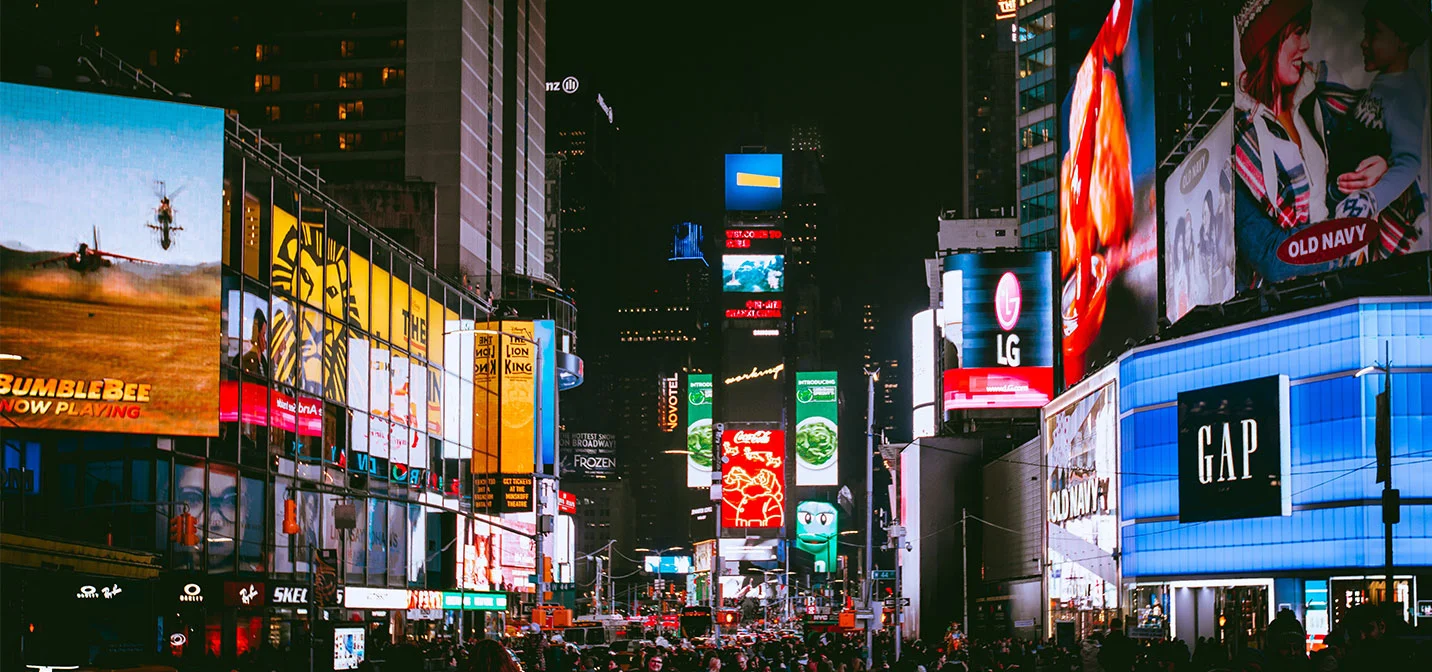The world of offline advertising is gradually evolving to make marketing and advertising easier for business owners. Thanks to modern technologies like beacons and geo-fencing, it’s easier than ever to track and personalize all sorts of advertising. Though out-of-home (OOH) advertising is one of the earliest forms of advertising, digitization has transformed it into digital out-of-home (DOOH) advertising. DOOH advertising utilizes adtech solutions to provide outdoor marketing, targeting, data, and analytics in real-time.
In this article, we will learn more about out-of-home advertising, its benefits, and emerging trends to explain why it is necessary for business owners, marketers, or advertisers.
What is OOH?
Out-of-home advertising is any form of visual advertising found outside of a home. Examples may include ads placed on billboards, in airports, and in stadiums. Many of the world’s largest brands such as Apple, Coca-Cola, McDonald’s, HBO, and more use this form of advertising. Even companies that specialize in online advertising such as Facebook and Google regularly use OOH Advertising to reach their consumers.
Some of the common types of OOH advertising include outdoor signs, billboard ads, bus shelters or benches, taxis, travel locations like train stations or airports, and media ads you may see in the cinemas or stadiums. When you see an advertisement outside of your home, you are most likely viewing some form of OOH ad.
Though OOH is one of the oldest forms of advertising, it is becoming more popular because now it combines modern digital marketing strategies, also known as “Digital Out-of-Home Advertising” (DOOH), to make it a highly-effective, digitally optimized advertising medium for brands. OOH advertising has many key benefits, and with the technologies of DOOH the possibilities for tracking and personalization have grown significantly.
Benefits of Out of Home Advertising
1. Reach a Wider Audience
Research has shown that, on average, a consumer needs to be exposed to an advertisement at least ten times before they are likely to show interest or perform an action. Since OOH advertising takes the form of ads in highly frequented spaces like billboards, transit areas, cinemas, and more, there is a higher potential for reaching consumers with marketing messages numerous times.
With OOH advertising, businesses can reach a large audience in the physical world, and it doesn’t drown in the digital landscape of mobile advertisements that face significant competition for attention in a small space.
2. Avoid Ad Blockers
One of the issues that marketers and advertisers face with online digital advertising is that ad blockers affect the viewability of digital ads. Ad blockers combined with the amount of information consumers receive online, make it easy to understand why online digital advertising may not be the best solution for some brands to stand out. OOH advertisements cannot be blocked by ad blockers and can capture the attention of consumers due to their size and placement near areas of transit or travel for commuters or shoppers.
Also, studies have discovered that consumers are 48% more likely to respond to a digital ad after initial exposure to an OOH ad. Therefore, OOH advertising positively compliments digital advertising.
3. Achieve Cost-effectiveness
According to research results from ATA Outdoor and other online sources, the cost per thousand impressions (CPM) for OOH advertising ranges from about $.06 to $9.00. Other forms of advertising can have CPMs as high as $58.00, so it is easy to see why OOH advertising provides value at a lower cost.
3. Convert Viewers to Buyers
The primary goal of advertising or marketing is to convert views or clicks on an advertisement of a product or service into purchases. When analyzing marketing data, one of the critical indicators to look out for is how many people choose to buy a product or service after seeing an advertisement.
In 2020, Nielsen conducted a study on digital billboards and digital street-level advertising, like bus posters, to find out how many people noticed the ads and how many ended up buying the product. Below are some results from the study.
- About 52% of participants confirmed they noticed digital street-level ads all the time.
- 62% of the survey responders also said they noticed digital billboards for four consecutive weeks.
- Approximately 60% of viewers with smartphones have engaged in actions on their mobile device after seeing a digital transit ad in the past year
The study showed that OOH advertising is an effective tool for engaging the consumer and convincing them to take action on an advertised product or service.
Trends in Out-of-Home Advertising
1. Digital Out-of-Home Advertising
Digital out-of-home advertising, or DOOH, is simply the digitized form of OOH. DOOH combines traditional advertising with modern digital tools to make outdoor advertising more effective for businesses or advertisers. For instance, ads usually displayed on bus timetables are no longer shown on paper posters. Instead, a digital screen showcases different ads about local food businesses, a new shopping mall, or even a real estate business for people to see. DOOH is an effective way to boost brand awareness while also more deeply engaging the target audience, as those who have seen the ad can also be retargeted on their mobile phone
Another benefit of DOOH is that changing billboards is no longer a daunting and time-consuming task. With DOOH the ad can be digitally updated; the setting up of the display is not as difficult as with older paper ads that could also get destroyed by the elements.
Furthermore, digital billboards can be interactive and subject to changes, making it easier to pass a message to your specific target audience. Some of the reasons why DOOH or digital out-of-home advertising is one of the trending forms of outdoor advertising include:
- DOOH contains various features that allow advertisers to change displays effortlessly.
- Advertisers or marketers can publicize multiple ads simultaneously.
- Digital out-of-home advertising is cost-effective and takes considerably less effort to put up.
- There is control over when to display the ad by taking into consideration peak traffic times .
2. Data-Focused Campaigns
Data-focused digital out-of-home advertising campaigns allow brands to tailor the communication and display the ads only for targeted audience segments. This means an advertiser can target a specific message for when it will be most relevant (for example, displaying an ad for lunch items in the middle of the day). The possibilities vary by placement – for example, a DOOH ad placed near a school can display the ad at times when the parents arrive to pick their children up. Factors that can be taken into consideration include time and location. Due to the accessibility and effectiveness of dynamically targeted campaigns, advertisers can use specific content to effortlessly reach their target audience and increase ROI as well as sales.
3. Creative and Engaging Brand Communication
Creative and engaging brand campaigns allow consumers to interact with, be entertained by, and build lasting relationships with different brands. There have been multiple instances of creative Digital OOH ads that have gone viral on the internet for their novel ideas and engaging messaging. An example is a BBC ad for the Dracula TV show that created a lot of buzz. Creative OOH ads leave a memorable and positive impression of the brand in the minds of the consumers.
In Conclusion
Digital out-of-home (DOOH) advertising brings the benefits of OOH with the edge and precision of modern technology. It uses data-driven intelligence to target specific markets and audiences. DOOH updates the physicality of traditional OOH with sophisticated and easier alternatives like electronic ad displays.
Want to learn more?
Get a demo to learn about Azira’s DOOH solutions.




